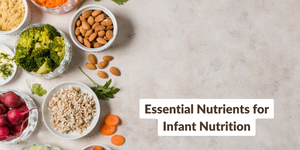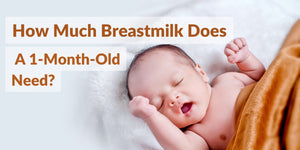Once your infant's appetite increases drastically as they grow, you might start thinking about starting solids for babies. At about six months of age, your baby needs more nutrition than breastmilk or formula milk can give them. Introducing the right solid foods to your baby’s diet at this time can fulfil your baby’s nutrition needs and help in their development. This process is known as weaning.
As a parent, you may be excited that your baby has begun this new phase of eating solid foods, but you may also be concerned about when, how, and what type of food you should feed your baby. Here are some answers to the majority of your concerns starting solids for babies.
When To Introduce Solid Foods To Baby?
Your child is typically ready for solid foods when they are about 6 months old and show the following developmental signs:- They sit upright with little or no support.
- They can hold their heads for an extended period of time.
- When you bring food or a spoon near their mouth, they open their mouth and lean forward.
- The baby remains hungry even after eight to ten breastfeeds in a day.
How Can I Decide The Type of Food and The Amount to Start with?
As you begin introducing solid foods to baby, start with semisolid, mashed or pureed foods that are easy to swallow; bland in taste; easy to digest; rich in calories, vitamins and minerals; and low in fibre. Examples of semi solid food for babies include- Smooth, pureed (de-seeded) fruits like apple and pear.
- Vegetables with low fibre content, such as potato, yam, sweet potato, and carrot
- Pulses, cooked and finely mashed
- Unsweetened cereals such as rice cereal.
How To Introduce Solid Food To Baby
When introducing solid foods to baby, introduce only one new single-ingredient food at a time (about every 5 days). Once your baby has accepted and become accustomed to these foods, you can gradually introduce new flavours and progress to mashed foods.
Your baby can progress to foods with a lumpy or slightly chewy texture in a matter of weeks to encourage chewing. At around 7 or 8 months old, a small amount of salt can be added to the baby's first food.
Babies begin to show signs of readiness to eat with their own hands around 9 months of age. As you bring the spoon to their mouth, they may try to grab the spoon or the food. This is an excellent way to determine that your infant is eager to be independent!
This is the right time to give your baby a wide variety of finger foods to entice him/her into trying new tastes and textures. Finger foods are foods that your baby can easily grasp and eat with their own hand. They teach your baby to self-feed and improve hand-eye coordination. Cheese cubes; cooked foods such as pasta, chapati, and potato; soft-cooked vegetables or fruits such as carrot, apple, and banana; hard-boiled eggs; and meat without bones are some solid food examples your baby may enjoy.
You can start with a teaspoon of food when you first introduce solid foods to your baby, gradually increase it to a tablespoon and then to a small cup.
The World Health Organization (WHO) recommends starting with two to three meals per day for babies aged 6 to 8 months and increasing to three to four meals per day with one or two additional snacks if needed between the ages of 9 and 23 months.
What safety precautions are necessary while introducing solid food to babies?
Although your baby is now eating solid foods, WHO recommends that you should continue breastfeeding till about 2 years or more.
The following precautions should be taken to ensure the safety of your child when introducing solid foods to baby:
Only add one new ingredient to your baby's diet at a time. This way, if your baby develops an allergy, you can easily identify the food that caused it.
The following practices can help keep your baby from choking:
- Avoid foods that are a choking hazard, e.g., hard foods like nuts and seeds and raw fruits or vegetables such as apples or carrots.
- Cut the food into tiny pieces.
- The feeding bottles should not contain any solid food.
- Feeding your baby in an upright position.
- Ask your child to sit while eating or drinking, and keep an eye on them at all times.
Prevent infections by ensuring that the food and water you give your baby is not contaminated.
Food to avoid
The following foods should be avoided because they may be harmful to your infant who is just starting solid foods:- Cow's milk and honey until your child is a year old.
- Unpasteurised milk products can cause infections.
- Sugar, as it can cause tooth decay.
- Salt, as it can affect your baby’s kidneys.
- Shellfish, which can be a choking hazard, and other fish that may contain mercury, which can affect your baby's nervous system.
- Nuts and peanuts, as they are choking hazards and can cause allergies.
Weaning your baby is essential because breastmilk alone cannot meet your baby's nutritional needs. As solid foods are introduced into your little one's diet, their poop will become harder and firmer, with odour changes and the appearance of some undigested food. Your baby may pass loose stools at times due to new foods. You can use fortified foods or vitamin supplements if you believe your baby is not getting enough nutrients from homemade weaning foods.
If you have any questions about your baby's diet, contact your paediatrician or a nutritionist.
References:
- World Health Organization. Infant and young child feeding [2020].
- CDC. When, what and how to introduce solid foods [2020].
- Cleveland Clinic. Feeding your baby: The first year [2020].
- UCSF. Benioff Children’s Hospital. FAQs Introducing your baby to solid foods.






LEAVE A COMMENT